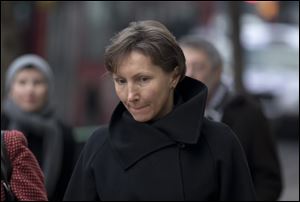
Litvinenko lawyer accuses UK, Russia of cover-up in inquest into ex-spy's death
2/26/2013
Marina Litvinenko, the widow of former Russian intelligence officer Alexander Litvinenko who died in a London hospital in 2006, with the rare radioactive substance polonium-210 being found in his body.
LONDON — A lawyer for the family of former Russian spy Alexander Litvinenko accused the British and Russian governments today of trying to stymie a long-delayed inquest into his poisoning death.
Litvinenko, a Russian intelligence agent turned Kremlin critic, died in London in November 2006 after drinking tea laced with the rare radioactive isotope polonium-210.
The allegations of a cover-up came at a London court hearing where British media organizations challenged a government bid to hold parts of the inquest in secret for security reasons. In Britain, inquests are held to determine the facts whenever someone dies violently, unexpectedly or in disputed circumstances.
Ben Emmerson, the lawyer for Litvinenko's widow Marina, said the government's quest for secrecy was delaying proceedings and suggested that foreign policy — namely trade relations — could be at the heart of the matter.
“We know nothing about why these applications are being made and we are dancing in the dark,” he told coroner Robert Owen. “This is beginning to look like you're being steamrollered by two states acting in collaboration with each other.”
Lawyers for Litvinenko's family say at the time of his death he was working for the British intelligence services, and Britain accuses two Russians of the killing. Moscow authorities have refused to extradite them for trial.
British government lawyer Neil Sheldon said “the disclosure of the material in question would pose a real risk to the public interest.”
Emmerson — who said the inquest is “shaping up to be a stain on British justice” — called the government's arguments for secrecy absurd.
Alex Bailin, the lawyer representing prominent British media organizations, insisted at the very least the government must clarify what issues are at stake and what harm they could cause.
Failing to do so, he said, “would have the very serious effect of undermining the public's confidence in this inquest.”
The inquest was due to start May 1. But Owen, the coroner, said today he was “becoming increasingly concerned that due to the complexity of the investigation which necessarily precedes the hearings, that may be a timetable to which it may not be possible to adhere.”
The Litvinenko process has been delayed until now because, for a long time, officials thought there was a chance the Russian suspects could be prosecuted. But last year, it became clear that the U.K. would not be able to put the two suspects on trial.
Emmerson said Marina Litvinenko was “extremely disappointed” by the prospect of further delays.
“Not as disappointed as me,” Owen said.
The hearing was adjourned until Wednesday.